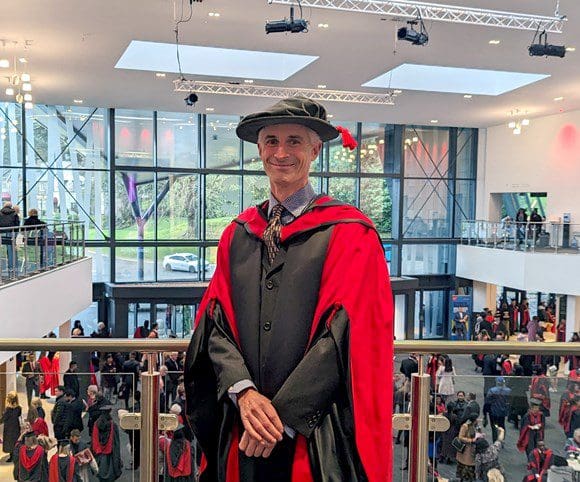This week, Dr George Rose is graduating with his PhD from University of South Wales (USW). His research, into pre-surgery exercise tests has uncovered important findings for clinical practice.
In collaboration with Cardiff and Vale University Health Board Department of Anaesthetics and supervised by Professor Damian Bailey, Dr Rose analysed over a decade of patient data to better identify and guide care for patients who may be at high risk of dying or having complications after surgery.
Testing the fitness of patients is often used in hospitals to assess suitability for major surgery by recording the performance of the heart and lungs to delivery oxygen at rest and during exercise. This is known as a cardiopulmonary exercise test.
However, Dr Rose wanted to delve deeper into the data from over 3000 patients, to better understand cardiorespiratory fitness – how well the body can supply and use oxygen for energy production.
“If we can better understand cardiorespiratory fitness in patients then we can explore new thresholds of fitness that can be used to predict how a patient will cope after surgery,” Dr Rose said.
“Undergoing surgery has been likened to running a marathon, in terms of the stress the body goes through. The heart and lungs deliver oxygen to our muscles and organs, and I wanted to understand how surgical patients respond to an increased demand for oxygen. That information is a strong predictor of how they will cope with surgery.”
“My research has indicated that patients with a higher level of cardiorespiratory fitness are five times more likely to survive surgery, less likely to spend time on a High Dependency Ward and will leave hospital two days earlier.”
Dr Rose’s research has gained interest from clinicians regarding preparing patients for surgery by improving fitness.
“If you have a cancer patient, for example, who is having surgery in 12 weeks. There is a window to improve their fitness with exercise and achieve better outcomes from the surgery. They could potentially leave hospital sooner and back to the comfort of their own homes,” Dr Rose said.
Dr Rose completed the PhD part-time over 7 years, alongside his role as an academic, delivering lectures to USW BSc and MSc Sport and Exercise Science courses. He said: “My students have benefitted from research-informed teaching and experienced first-hand development of current subject knowledge”.
Regarding the future, Dr Rose said: “From a personal perspective, I aim to expand the research with more studies to help inform clinical practice. For example, when observing differences between male and female responses to the cardiorespiratory fitness tests, males typically perform 10-30% better yet survival rates are the same as females. Currently, the fitness risk thresholds for surgery are universal. Therefore, should we have different fitness thresholds for male and female patients? I’d like to investigate this further.”

